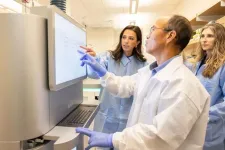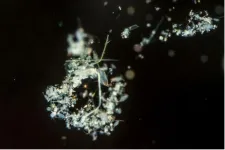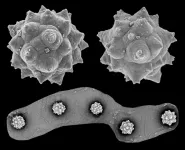(Press-News.org) The UK government should resist allowing AI companies to scrape all copyrighted works unless the holder has actively “opted out”, as it puts an unfair burden on up-and-coming creative talents who lack the skills and resources to meet legal requirements.
This is according to a new report from University of Cambridge experts in economics, policy and machine learning, who also argue the UK government should clearly state that only a human author can hold copyright – even when AI has been heavily involved.
A collaboration between three Cambridge initiatives – the Minderoo Centre for Technology and Democracy, the Bennett Institute for Public Policy, and ai@cam – the report argues that unregulated use of generative AI will not guarantee economic growth, and risks damaging the UK’s thriving creative sector.
If the UK adopts the proposed ‘rights reservation’ for AI data mining, rather than maintaining the legal foundation that automatically safeguards copyright, it will compromise the livelihoods of many in the sector, particularly those just starting out, say researchers.
They argue that it risks allowing artistic content produced in the UK to be scraped for endless reuse by offshore companies.
“Going the way of an opt-out model is telling Britain’s artists, musicians, and writers that tech industry profitability is more valuable than their creations,” said Prof Gina Neff, Executive Director at the Minderoo Centre for Technology and Democracy at the University of Cambridge.
“Ambitions to strengthen the creative sector, bolster the British economy and spark innovation using GenAI in the UK can be achieved – but we will only get results that benefit all of us if we put people’s needs before tech companies.”
Creative industries contribute around £124.6 billion or 5.7% to the UK’s economy, and have a deep connection to the tech industry. For example, the UK video games industry is the largest in Europe, and contributed £5.12 billion to the UK economy in 2019.
While AI could lead to a new generation of creative companies and products, the researchers say that little is currently known about how AI is being adopted within these industries, and where the skills gaps lie.
“The Government ought to commission research that engages directly with creatives, understanding where and how AI is benefiting and harming them, and use it to inform policies for supporting the sector’s workforce,” said Neil Lawrence, DeepMind Professor of Machine Learning at the University of Cambridge and Chair of ai@cam.
“Uncertainty about copyright infringement is hindering the development of Generative AI for public benefit in the UK. For AI to be trusted and widely deployed, it should not make creative work more difficult.”
In the UK, copyright is vested in the creator automatically if it meets the legal criteria. Some AI companies have tried to exploit “fair dealing” – a loophole based around use for research or reporting – but this is undermined by the commercial nature of most AI.
Now, some AI companies are brokering licensing agreements with publishers, and the report argues this is a potential way to ensure creative industries are compensated.
While rights of performers, from singers to actors, currently cover reproductions of live performances, AI uses composites harvested from across a performer’s oeuvre, so rights relating to specific performances are unlikely to apply, say researchers.
Further clauses in older contracts mean performers are having their work “ingested” by technologies that didn’t exist when they signed on the dotted line.
The researchers call on the government to fully adopt the Beijing Treaty on Audio Visual Performance, which the UK signed over a decade ago but is yet to implement, as it gives performers economic rights over all reproduction, distribution and rental.
“We propose mandatory transparency requirements for AI training data and standardised licensing agreements that properly value creative works. Without these guardrails, we risk undermining our valuable creative sector in the pursuit of uncertain benefits from AI,” said Prof Diane Coyle, the Bennett Professor of Public Policy at the University of Cambridge.
The Cambridge experts also look at questions of copyright for AI-generated work, and the extent to which “prompting” AI can constitute ownership. They conclude that AI cannot itself hold copyright, and the UK government should develop guidelines on compensation for artists whose work and name feature in prompts instructing AI.
When it comes to the proposed ‘opt-out’ solution, the experts it is not “in the spirit of copyright law” and is difficult to enforce. Even if creators do opt out, it is not clear how that data will be identified, labelled, and compensated, or even erased.
It may be seen as giving “carte blanche” to foreign-owned and managed AI companies to benefit from British copyrighted works without a clear mechanism for creators to receive fair compensation.
“Asking copyright reform to solve structural problems with AI is not the solution,” said Dr Ann Kristin Glenster, Senior Policy Advisor at the Minderoo Centre for Technology and Democracy, and lead author of the report.
“Our research shows that the business case has yet to be made for an opt-out regime that will promote growth and innovation of the UK creative industries.
“Devising policies that enable the UK creative industries to benefit from AI should be the Government’s priority if it wants to see growth of both its creative and tech industries,” Glenster said.
END
Forcing UK creatives to ‘opt out’ of AI training risks stifling new talent
2025-02-20
ELSE PRESS RELEASES FROM THIS DATE:
Almost 90% of people would agree to genetic testing to tailor medication use, survey finds
2025-02-20
New research shows almost 90% of people in England would agree to genetic testing to get the most effective medication and reduce the risk of side effects
85% thought that the NHS should offer pharmacogenomic testing to people with multiple health conditions
58% of people thought that the NHS should offer this testing to everyone
91% wanted access to their own pharmacogenomic data, with many wanting this via the NHS app
Pharmacogenomics – an individual’s genetic response to medications – is an increasingly important strand of personalised healthcare but little is known about the public's views ...
Study: UTA research drives widespread economic impact
2025-02-19
University of Texas at Arlington research projects contributed $59 million to the national economy in 2024—an increase of 39% from 2023, according to a new report from the Institute for Research on Innovation and Science (IRIS).
UTA has invested heavily in research infrastructure, purchasing cutting-edge scientific equipment and technology, such as North Texas’ most advanced gene sequencer and a super-sensitive magnetic resonance imaging machine for the Clinical Imaging Research Center. The funds also support collaboration with other research organizations.
UTA worked through 1,144 unique ...
Promising results from first prenatal therapy for spinal muscular atrophy
2025-02-19
(MEMPHIS, Tenn. – February 19, 2025) Spinal muscular atrophy (SMA) is a progressive neurodegenerative disorder set in motion before birth. Scientists at St. Jude Children’s Research Hospital led the first in uterotreatment of SMA with the orally administered drug risdiplam. More than two years after the child was born, no identifiable features of SMA have been observed. This study demonstrates the feasibility of treating SMA prenatally and supports further investigation into the approach. The findings were published ...
Nitrogen fixation on marine particles is important in the global ocean
2025-02-19
How on Earth?
It has puzzled scientists for years whether and how bacteria, that live from dissolved organic matter in marine waters, can carry out N2 fixation. It was assumed that the high levels of oxygen combined with the low amount of dissolved organic matter in the marine water column would prevent the anaerobic and energy consuming N2 fixation.
Already in the 1980s it was suggested that aggregates, so-called “marine snow particles”, could possibly be suitable sites for N2fixation, ...
FDA approves vimseltinib for tenosynovial giant cell tumor (TGCT)
2025-02-19
The U.S. Food and Drug Administration (FDA) has approved vimseltinib (RomvimzaTM) for adult patients with a rare condition called tenosynovial giant cell tumor (TGCT). TGCT is a tumor of the tissue that lines the joints.
Sarcoma oncologist William Tap, MD, Chief of the Sarcoma Medical Oncology Service at Memorial Sloan Kettering Cancer Center (MSK), led the international phase 3 MOTION trial that resulted in the drug’s approval. Vimseltinib is a type of targeted therapy called a kinase inhibitor and is taken as a pill.
“This approval is an exciting advance for ...
Columbia Climate School launches M.S. in Climate Finance
2025-02-19
The Columbia Climate School has announced the first master’s degree program in the United States for climate finance. In close collaboration with the Columbia Business School, this interdisciplinary degree will drive impactful solutions to the climate crisis through advanced financial tools and scientific knowledge. This is the third master’s program announced by the Climate School, in addition to an M.A. in Climate and Society and an M.S. in Climate degree.
“The world needs problem-solvers to address the global climate crisis,” said Alexis Abramson, dean of the Columbia Climate School. “Everyone ...
MD Anderson receives nearly $23 million in CPRIT funding for cancer research, faculty recruitment
2025-02-19
HOUSTON ― The University of Texas MD Anderson Cancer Center today was awarded nearly $23 million from the Cancer Prevention and Research Institute of Texas (CPRIT) in support of 20 cancer research projects to advance new breakthroughs in discovery, translational, clinical and prevention science. In addition, CPRIT awarded $2 million for the recruitment of one first-time, tenure-track faculty member.
“We sincerely appreciate CPRIT’s continued funding of impactful cancer research that will help us achieve our mission to end cancer,” said ...
A new way to observe electrons in motion
2025-02-19
Electrons oscillate around the nucleus of an atom on extremely short timescales, typically completing a cycle in just a few hundred attoseconds (one attosecond is a quintillionth of a second). Because of their ultrafast motions, directly observing electron behavior in molecules has been challenging. Now researchers from UC San Diego’s Department of Chemistry and Biochemistry have suggested a new method to make visualizing electron motion a reality.
This new method describes an experimental concept called ultrafast vortex electron diffraction, which allows ...
Study reveals palm trees once thrived in subarctic Canada
2025-02-19
New London, Conn. — A new study by Connecticut College provides strong evidence that palm trees once thrived in subarctic Canada, reshaping scientific understanding of past Arctic climates.
Conn Professor Peter Siver’s research, published in the journal Annals of Botany, confirms that during the late early Eocene—approximately 48 million years ago—this region maintained warm temperatures year-round, even during months of winter darkness. The work was done in collaboration with colleagues from Canada and Poland.
Siver’s team identified fossilized phytoliths—microscopic ...
Is smoking tied to unexplained stroke in younger adults?
2025-02-19
MINNEAPOLIS — Smoking, particularly heavy smoking, is linked to some unexplained strokes in younger adults, mainly in male individuals and in people ages 45 to 49, according to a study published in the February 19, 2025, online issue of Neurology® Open Access, an official journal of the American Academy of Neurology.
A stroke with no known cause, called a cryptogenic stroke, is a type of ischemic stroke caused by a blockage of blood flow, but it is unclear what has caused the blockage. Symptoms include weakness, trouble speaking and vision problems. Strokes can be fatal. Most strokes occur after age 65.
“While smoking has long been linked to ischemic stroke, ...



